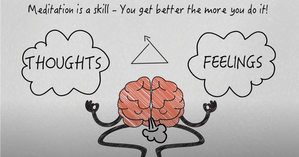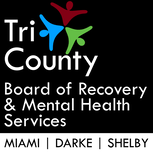Resilience
|
Resilience is the quality of being able to resist temptations, overcome circumstances, and be mindful of one's own ability to make choices that can determine quality of life.
Beginning at a very young age and continuing throughout our lifetimes, we are challenged with opportunities to make good or bad choices. We are subject to modeling behaviors from parents and siblings, by peer pressure in and out of school, by advertising, and even by our own biological systems. The more we know and recognize these pressures, the better equipped we are to make healthy lifestyle choices, avoid addicting substances, develop nurturing and supportive relationships with others, and know when to seek help before reaching a point from which it is very difficult to return. The Tri-County Board supports programs for schools, for at-risk professions such as law enforcement officers, and others to develop resilience. |
Coping Skills and Strategies

Mindfulness
Most of the time our brains operate on autopilot, going about our daily activities without much through or reflection. Under stress or after a trauma, this autopilot can get hijacked by intrusive negative thoughts, worry, and anxiety. One very effective technique for re-taking control of our thoughts is through mindfulness meditation. What follows are links to several videos that explain why meditation is useful, how it works in the brain and body, and how to practice doing it. Many other videos and smartphone apps are available to help guide mindful meditation.
MINDFULNESS MEDITATION WATCH VIDEO
MEDITATION 101: A BEGINNERS GUIDE WATCH VIDEO
MEDITATION PRACTICE: CONTROLLED BREATHING WATCH VIDEO
Most of the time our brains operate on autopilot, going about our daily activities without much through or reflection. Under stress or after a trauma, this autopilot can get hijacked by intrusive negative thoughts, worry, and anxiety. One very effective technique for re-taking control of our thoughts is through mindfulness meditation. What follows are links to several videos that explain why meditation is useful, how it works in the brain and body, and how to practice doing it. Many other videos and smartphone apps are available to help guide mindful meditation.
MINDFULNESS MEDITATION WATCH VIDEO
MEDITATION 101: A BEGINNERS GUIDE WATCH VIDEO
MEDITATION PRACTICE: CONTROLLED BREATHING WATCH VIDEO
Make stress reduction a priority. Take breaks. Relieve stress in the moment. Practice breathing techniques. Visualize peaceful images. Do something creative. Read a book. Take a bath. Do something fun. Play. Laugh. Find joy. Enjoy a funny or uplifting movie. Engage in mentally stimulating activities. Learn something new.
Self-Care
Taking care of your own needs is not selfish even during a time of crisis. It is just as critical as taking care of others.
Stress makes you more susceptible to:
To build resilience one must maintain healthy:
The Stress Test - Life Change Index Scale Know what is causing stress in your life
Core Person Values - Know what makes you tick
Check Up from the Neck Up - Free, confidential screening
Seek professional help when you:
Stress makes you more susceptible to:
- Physical illness
- Mental illness
- Emotional illness
To build resilience one must maintain healthy:
- Physical wellness
- Mental wellness
- Emotional wellness
The Stress Test - Life Change Index Scale Know what is causing stress in your life
Core Person Values - Know what makes you tick
Check Up from the Neck Up - Free, confidential screening
Seek professional help when you:
- Have trouble functioning at home and work
- Experience nightmares and flashbacks
- Fear things that are not threatening
- Have a difficult time connecting and relating to others
- Are not able to relax
- Experience suicidal thoughts or feelings
Supporting Others
Challenge your sense of helplessness. Positive action can help you overcome feelings of fear, helplessness and hopelessness. Small actions can make a big difference. Volunteer your time. Donate blood. Donate to charity. Check in on others. Help a family member, friend or neighbor
Helping others improves your sense of control, belonging, self-esteem, sense of purpose
Keep a regular daily routine. Engage in goal oriented tasks/activities. Focus on progress made each day. Do something each day that gives a sense of purpose. Visualize positive outcomes. Accept what you can and cannot control.
Helping others improves your sense of control, belonging, self-esteem, sense of purpose
Keep a regular daily routine. Engage in goal oriented tasks/activities. Focus on progress made each day. Do something each day that gives a sense of purpose. Visualize positive outcomes. Accept what you can and cannot control.

